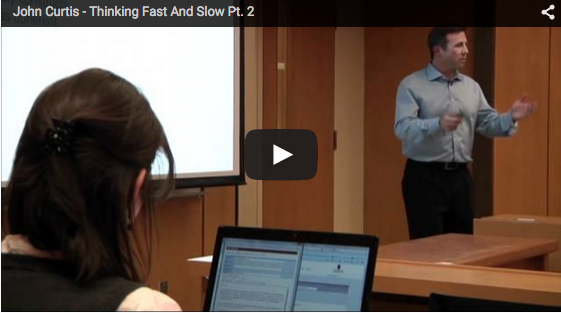While a fallen hero, Lance Armstrong perfectly describes the theory of loss aversion: “I like to win, but more than anything, I can’t stand this idea of losing.” The pleasure we derive from winning is not as great as the pain we feel from losing, so we act to minimize and avoid loss. This can impede our ability to make rational, unbiased decisions. Why? How can we start to focus on the gains?
Loss Aversion: A Quiz
Psychologists Daniel Kahneman and Amos Tversky developed a quiz to test aversion to loss. Think about the following scenario:
The US is preparing for an outbreak of an unusual Asian disease, which is expected to kill 600 people. Two programs have been proposed to combat the disease. Assume that the exact scientific estimates of the consequences of the programs are as follows: If program A is adopted, 200 people will be saved. If program B is adopted, there is a 1/3 probability that 600 people will be saved and a 2/3 probability that no one will be saved.
Which Program Would You Choose?
Seventy-two percent of physicians chose option A. They went for the certainty of saving some lives over the risk that everyone might die. Now, consider the same scenario with these two options:
If program C is adopted, 400 people will die. If program D is adopted, there is a 1/3 possibility that nobody will die and a 2/3 possibility that 600 people will die.
Did you change your mind? The physicians did. Seventy-eight percent chose program D. And yes, program D is exactly the same as program B – which 78% of those same physicians opted against in the former scenario.
This quiz demonstrates that though situations can remain the same, how we frame them greatly influences our decisions.
Why Do We Do This? Blame It On the Brain
Kahneman posits that humans have two ways of processing thoughts: System 1 and System 2. System one is the “fast thinking brain.” It dominates; it’s louder, more brash – and it makes more mistakes. System 2, the “slow thinking brain,” is a plodder. It’s the one that sees a trick question and reminds us, “Hey, something’s not right here. Take a minute and think about it.”
It seems like a perfect pair, doesn’t it? System 1 comes in handy when we’re running from lions, while System 2 is an advantage when we face decisions that require more deliberate thought.
The problem is that the slow thinking brain is lazy. It’s like the parent who lets the child play without supervision in the backyard – with a swimming pool, a full set of steak knives, and a frothy neighbourhood dog.
Systems 1 and 2 in the Negotiation Room
This can get us into trouble when we’re trying to make rational decisions in a negotiation setting – this or course includes arguments with our significant others ☺ Our fast thinking brain makes split decisions, often based on our natural urge to avoid loss – at any, and often unreasonable costs.
Take this low-stakes example: Kahneman asked students in his class: “I’m going to toss a coin. If it’s tails, you lose $10. How much would you have to gain on winning in order for this gamble to be acceptable to you?” The answer: about $20.
The win had to be at least two times greater than the potential loss to be acceptable. The same holds true whether it’s $10 or $10,000, and presumably even $10,000,000. We ignore the potential win – even when it is statistically more likely – in favor of negating the loss.
Focusing on the Positive Rather than the Negative
How can we counter this instinct?
- Recognize that you are loss averse and try to be more rational about it. While degrees of loss aversion vary from person to person we are all loss averse. Is the risk really that great? Instead of basing decisions on fear or quick decisions, wake up the slow thinking brain and tell it to get to work. Do a thorough analysis to identify probable (not just possible) risks.
- Rather than focus on the size of the loss (e.g. we could lose $1million), focus on the probability of the loss (e.g. there is a 10% chance that we could lose $1million – or a 90% chance that we won’t!).
- Clearly identify the pros to offset potential cons. What do you have to gain? Remember, you need at least two gains for every loss. That doesn’t mean the positives are half as strong – just that your brain gives negatives more weight.
Loss aversion served our ancestors well. They needed to make rapid fire decisions; they didn’t have to contend with the complex problems we deal with today. Negotiations require more System 2 thinking, a slower, more measured approach that focuses on gains instead of merely trying to avoid losses.





